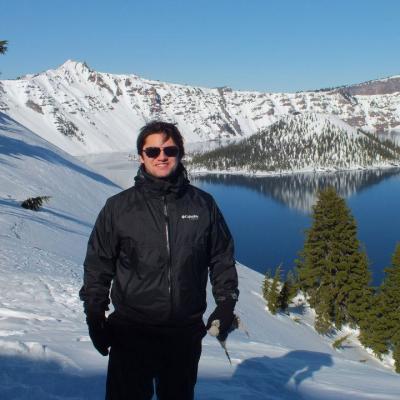Gonzalo Saldías is a 2016-2017 Banting Postdoctoral Fellow in the Earth, Ocean, and Atmospheric Sciences department at UBC. His research on the impact of numerous submarine canyons on upwelling of deep/slope water onto the continental shelf is focused particularly on the Barley, Juan de Fuca, and Quinault canyons of the Vancouver and northern Washington ocean shelf.

Research topic
Research Description
This research is based on process-oriented numerical modeling experiments of the flow field over a system of submarine canyons resembling the numerous canyons of the Vancouver and northern Washington shelf, namely the Barkley, Juan de Fuca, and Quinault canyons. We look to extend previous works by pursuing a variety of idealized modeling experiments to increase our understanding of the interaction of the flow field between the canyons under contrasting oceanographic scenarios, and the consequences on the upwelling source water on the continental shelf. This has profound biogeochemical implications as low-oxygen, high-nutrient, and low-pH acidified upwelling waters can have harmful effects on coastal ecosystems and fisheries. However, canyon-related upwelling has been also described to enhance seasonal productivity supporting diverse marine ecosystems. Oceanographic observations in the region around the Juan de Fuca Canyon will be also analyzed to complement our modeling results.
Why did you decide to pursue a postdoctoral fellowship at UBC? Did you consider other opportunities?
I decided to head to UBC because of its strong oceanographic research component, and more specifically, to work with one of the top researchers in the field of oceanography over submarine canyons.
What advice do you have for new postdoctoral fellows?
Plan your steps in advance and work hard for that. I think it is crucial to find a proper postdoctoral advisor, so meeting him/her and making sure you have synergy would be very beneficial.
What do you like to do for fun?
I like to swim and play soccer, but lately, I do have fun spending my free time with my family. I have practically switched soccer to all sorts of games my 3-year old daughter wants me to play with her.
What is the most enjoyable aspect of your postdoctoral fellowship?
It is a pleasure to work on your own research. Most postdoctoral opportunities are based on previously approved projects from a scientist and you apply to work on that. For me, it is much more significant to be able to get your own postdoctoral proposal approved - that gives you key initial experience on getting funded for your academic and research career.
What are the biggest challenges you have faced, or anticipate facing, in your career?
The greatest challenges have always been related to time management. When you are a graduate student and also have a family, it could be hard to find that right balance of work and family time. As a PhD Student, it seems that we always need more time for getting things done. However, organizing in an effective way to accomplish your goals step by step results in having more time for your personal life. I think this is necessary for a healthy lifestyle and for being more productive.
What in your life or career has prepared you for this position?
My long experience pursuing my own research has prepared me for this postdoctoral fellowship. I think that finding my own research topics at different academic levels (undergraduate, master's, doctoral) has also gradually prepared my research skills. I also think that having strong motivation helps to work hard - this is what I love for making a living, and consequently, I know I have to do very well to be successful.
What does receiving this award mean for your career?
Being awarded the NSERC Banting Postdoctoral Fellowship is the best that has happened in my academic life. Because of its highly competitive nature for outstanding young researchers worldwide, I feel that now I am in a very privileged position as a young scientist. This is very strong motivation to keep moving forward in my academic career.
What do you think the next step in your career will be?
I am positive I will be able to find a position as an assistant professor soon.